Australian Income Tax Law and Practice: A Comprehensive Report
VerifiedAdded on 2022/08/25
|12
|3075
|27
Report
AI Summary
This report provides a comprehensive overview of Australian income tax law and practice, addressing key aspects such as the taxation of residents and foreigners. It explores the implications of foreign investment, particularly within the agricultural business sector, and discusses the role of the Foreign Investment Review Board (FIRB). The report details the residency tests used to determine tax obligations and outlines the tax treatments applicable to both residents and non-residents. Furthermore, it examines capital gains tax, tax incentives offered by the Australian government, and the overall regulatory environment affecting foreign investment. The report also touches upon the incentives provided by the Australian government to encourage investment and economic growth, alongside implications for foreign investors, emphasizing the importance of understanding the Australian governance system and regulatory requirements. The report aims to provide a detailed understanding of the Australian tax system and its impact on various stakeholders.
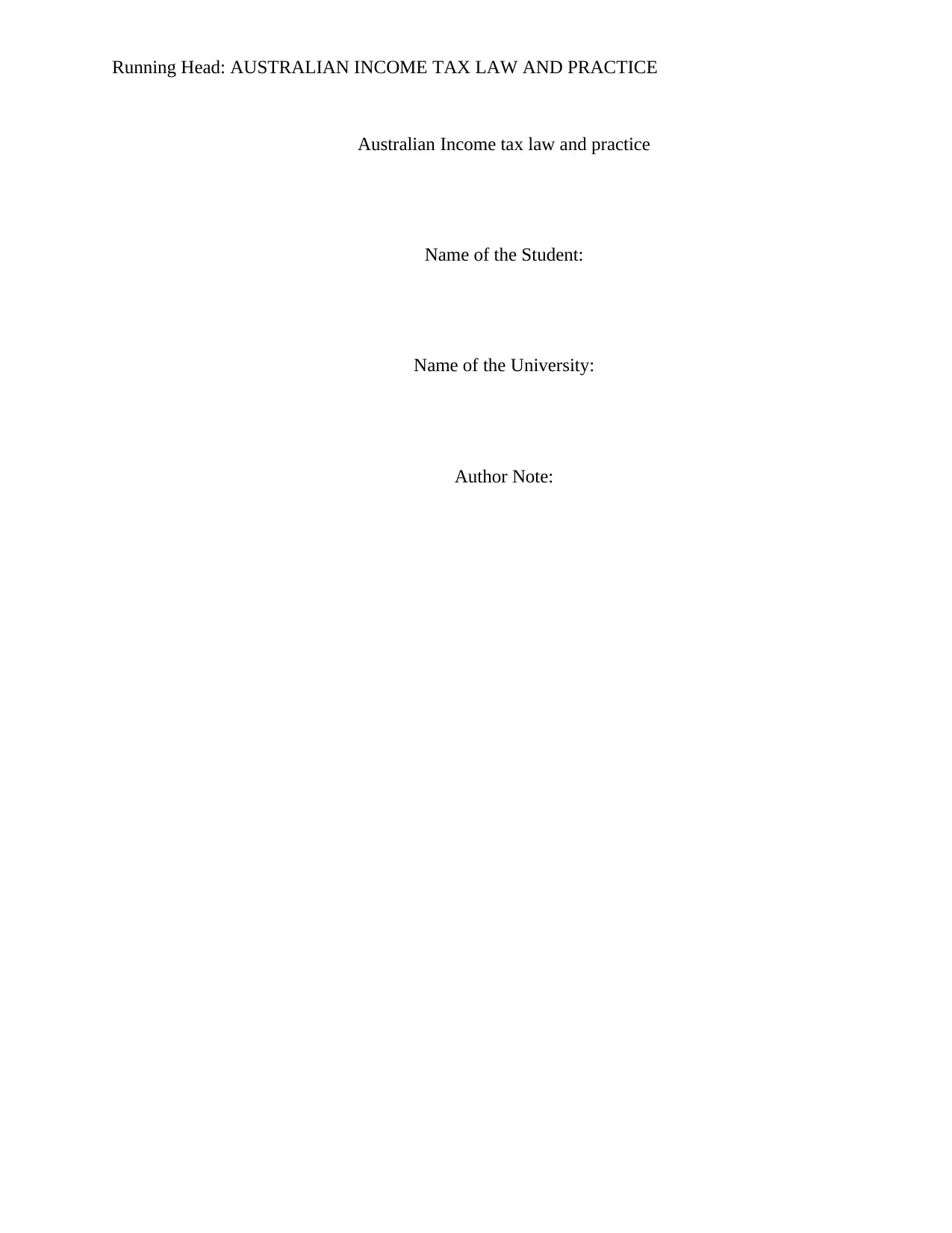
Running Head: AUSTRALIAN INCOME TAX LAW AND PRACTICE
Australian Income tax law and practice
Name of the Student:
Name of the University:
Author Note:
Australian Income tax law and practice
Name of the Student:
Name of the University:
Author Note:
Paraphrase This Document
Need a fresh take? Get an instant paraphrase of this document with our AI Paraphraser
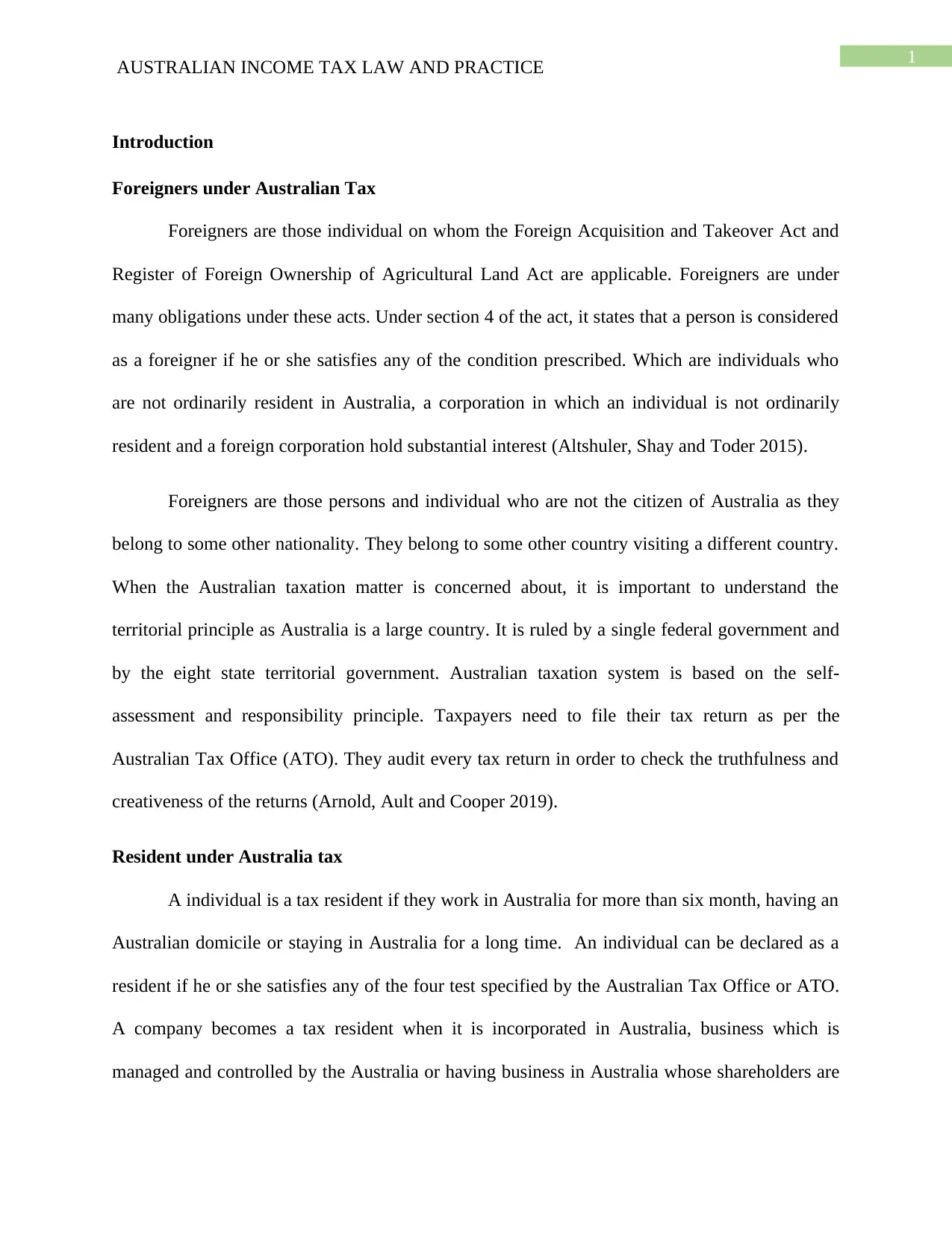
1
AUSTRALIAN INCOME TAX LAW AND PRACTICE
Introduction
Foreigners under Australian Tax
Foreigners are those individual on whom the Foreign Acquisition and Takeover Act and
Register of Foreign Ownership of Agricultural Land Act are applicable. Foreigners are under
many obligations under these acts. Under section 4 of the act, it states that a person is considered
as a foreigner if he or she satisfies any of the condition prescribed. Which are individuals who
are not ordinarily resident in Australia, a corporation in which an individual is not ordinarily
resident and a foreign corporation hold substantial interest (Altshuler, Shay and Toder 2015).
Foreigners are those persons and individual who are not the citizen of Australia as they
belong to some other nationality. They belong to some other country visiting a different country.
When the Australian taxation matter is concerned about, it is important to understand the
territorial principle as Australia is a large country. It is ruled by a single federal government and
by the eight state territorial government. Australian taxation system is based on the self-
assessment and responsibility principle. Taxpayers need to file their tax return as per the
Australian Tax Office (ATO). They audit every tax return in order to check the truthfulness and
creativeness of the returns (Arnold, Ault and Cooper 2019).
Resident under Australia tax
A individual is a tax resident if they work in Australia for more than six month, having an
Australian domicile or staying in Australia for a long time. An individual can be declared as a
resident if he or she satisfies any of the four test specified by the Australian Tax Office or ATO.
A company becomes a tax resident when it is incorporated in Australia, business which is
managed and controlled by the Australia or having business in Australia whose shareholders are
AUSTRALIAN INCOME TAX LAW AND PRACTICE
Introduction
Foreigners under Australian Tax
Foreigners are those individual on whom the Foreign Acquisition and Takeover Act and
Register of Foreign Ownership of Agricultural Land Act are applicable. Foreigners are under
many obligations under these acts. Under section 4 of the act, it states that a person is considered
as a foreigner if he or she satisfies any of the condition prescribed. Which are individuals who
are not ordinarily resident in Australia, a corporation in which an individual is not ordinarily
resident and a foreign corporation hold substantial interest (Altshuler, Shay and Toder 2015).
Foreigners are those persons and individual who are not the citizen of Australia as they
belong to some other nationality. They belong to some other country visiting a different country.
When the Australian taxation matter is concerned about, it is important to understand the
territorial principle as Australia is a large country. It is ruled by a single federal government and
by the eight state territorial government. Australian taxation system is based on the self-
assessment and responsibility principle. Taxpayers need to file their tax return as per the
Australian Tax Office (ATO). They audit every tax return in order to check the truthfulness and
creativeness of the returns (Arnold, Ault and Cooper 2019).
Resident under Australia tax
A individual is a tax resident if they work in Australia for more than six month, having an
Australian domicile or staying in Australia for a long time. An individual can be declared as a
resident if he or she satisfies any of the four test specified by the Australian Tax Office or ATO.
A company becomes a tax resident when it is incorporated in Australia, business which is
managed and controlled by the Australia or having business in Australia whose shareholders are
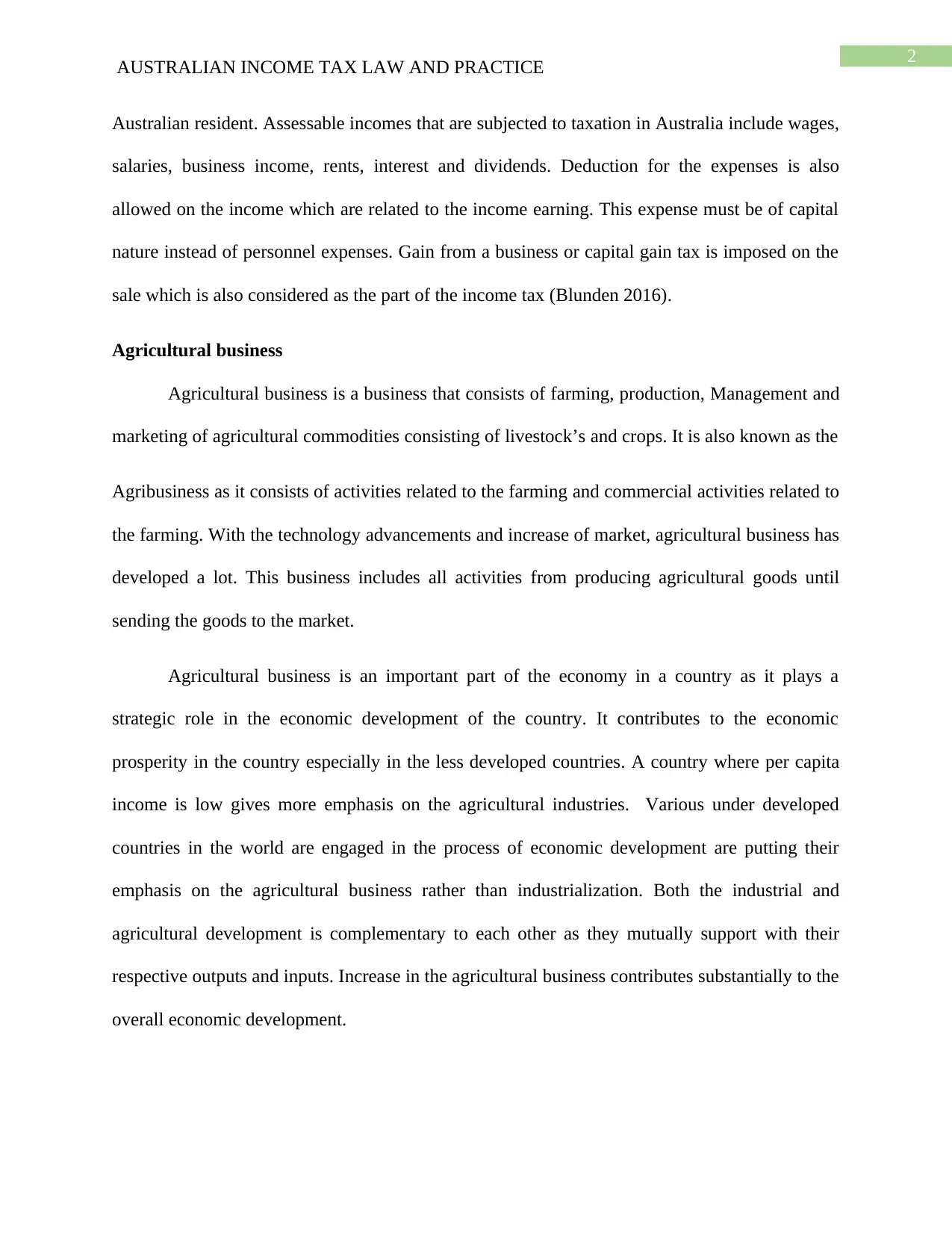
2
AUSTRALIAN INCOME TAX LAW AND PRACTICE
Australian resident. Assessable incomes that are subjected to taxation in Australia include wages,
salaries, business income, rents, interest and dividends. Deduction for the expenses is also
allowed on the income which are related to the income earning. This expense must be of capital
nature instead of personnel expenses. Gain from a business or capital gain tax is imposed on the
sale which is also considered as the part of the income tax (Blunden 2016).
Agricultural business
Agricultural business is a business that consists of farming, production, Management and
marketing of agricultural commodities consisting of livestock’s and crops. It is also known as the
Agribusiness as it consists of activities related to the farming and commercial activities related to
the farming. With the technology advancements and increase of market, agricultural business has
developed a lot. This business includes all activities from producing agricultural goods until
sending the goods to the market.
Agricultural business is an important part of the economy in a country as it plays a
strategic role in the economic development of the country. It contributes to the economic
prosperity in the country especially in the less developed countries. A country where per capita
income is low gives more emphasis on the agricultural industries. Various under developed
countries in the world are engaged in the process of economic development are putting their
emphasis on the agricultural business rather than industrialization. Both the industrial and
agricultural development is complementary to each other as they mutually support with their
respective outputs and inputs. Increase in the agricultural business contributes substantially to the
overall economic development.
AUSTRALIAN INCOME TAX LAW AND PRACTICE
Australian resident. Assessable incomes that are subjected to taxation in Australia include wages,
salaries, business income, rents, interest and dividends. Deduction for the expenses is also
allowed on the income which are related to the income earning. This expense must be of capital
nature instead of personnel expenses. Gain from a business or capital gain tax is imposed on the
sale which is also considered as the part of the income tax (Blunden 2016).
Agricultural business
Agricultural business is a business that consists of farming, production, Management and
marketing of agricultural commodities consisting of livestock’s and crops. It is also known as the
Agribusiness as it consists of activities related to the farming and commercial activities related to
the farming. With the technology advancements and increase of market, agricultural business has
developed a lot. This business includes all activities from producing agricultural goods until
sending the goods to the market.
Agricultural business is an important part of the economy in a country as it plays a
strategic role in the economic development of the country. It contributes to the economic
prosperity in the country especially in the less developed countries. A country where per capita
income is low gives more emphasis on the agricultural industries. Various under developed
countries in the world are engaged in the process of economic development are putting their
emphasis on the agricultural business rather than industrialization. Both the industrial and
agricultural development is complementary to each other as they mutually support with their
respective outputs and inputs. Increase in the agricultural business contributes substantially to the
overall economic development.
⊘ This is a preview!⊘
Do you want full access?
Subscribe today to unlock all pages.

Trusted by 1+ million students worldwide
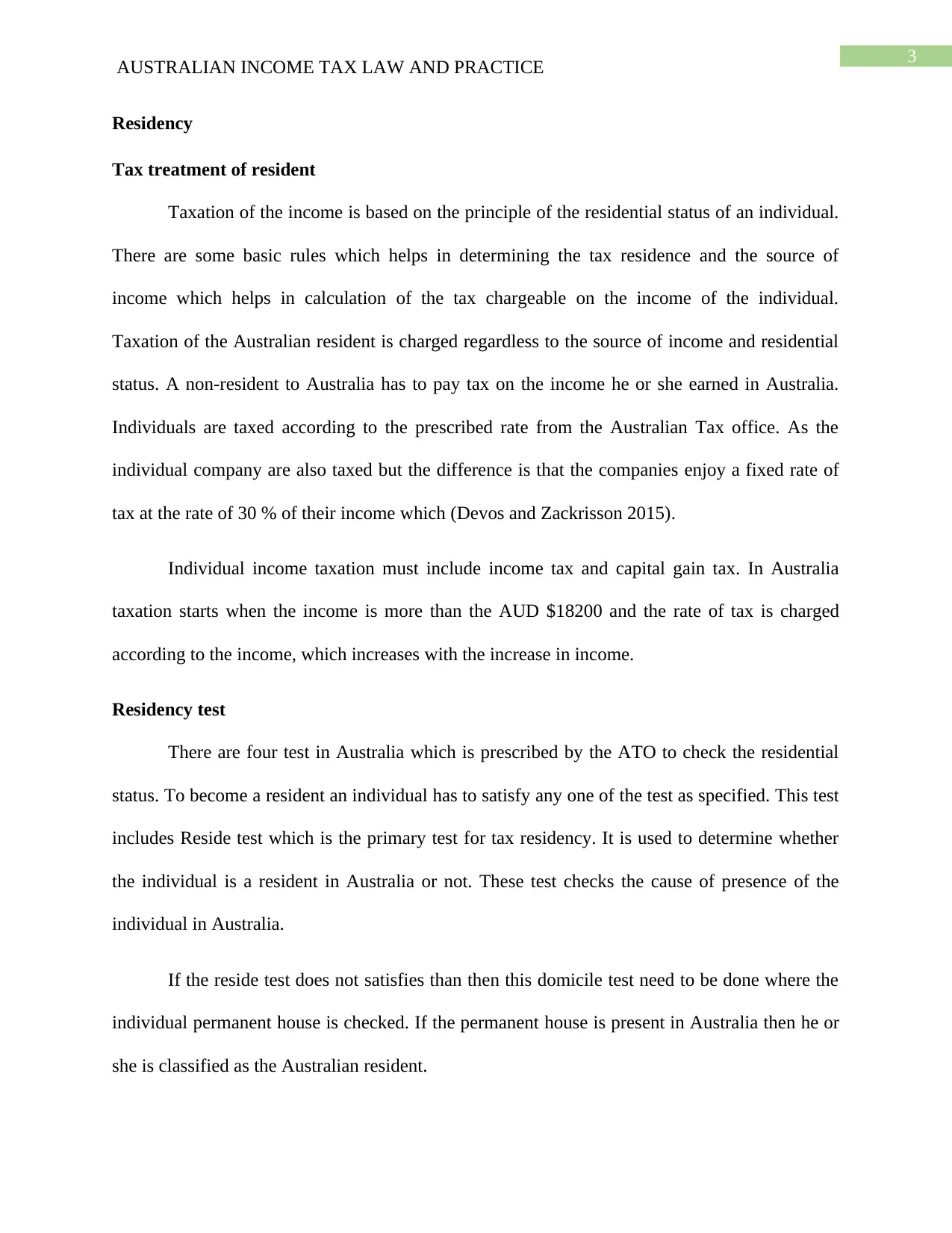
3
AUSTRALIAN INCOME TAX LAW AND PRACTICE
Residency
Tax treatment of resident
Taxation of the income is based on the principle of the residential status of an individual.
There are some basic rules which helps in determining the tax residence and the source of
income which helps in calculation of the tax chargeable on the income of the individual.
Taxation of the Australian resident is charged regardless to the source of income and residential
status. A non-resident to Australia has to pay tax on the income he or she earned in Australia.
Individuals are taxed according to the prescribed rate from the Australian Tax office. As the
individual company are also taxed but the difference is that the companies enjoy a fixed rate of
tax at the rate of 30 % of their income which (Devos and Zackrisson 2015).
Individual income taxation must include income tax and capital gain tax. In Australia
taxation starts when the income is more than the AUD $18200 and the rate of tax is charged
according to the income, which increases with the increase in income.
Residency test
There are four test in Australia which is prescribed by the ATO to check the residential
status. To become a resident an individual has to satisfy any one of the test as specified. This test
includes Reside test which is the primary test for tax residency. It is used to determine whether
the individual is a resident in Australia or not. These test checks the cause of presence of the
individual in Australia.
If the reside test does not satisfies than then this domicile test need to be done where the
individual permanent house is checked. If the permanent house is present in Australia then he or
she is classified as the Australian resident.
AUSTRALIAN INCOME TAX LAW AND PRACTICE
Residency
Tax treatment of resident
Taxation of the income is based on the principle of the residential status of an individual.
There are some basic rules which helps in determining the tax residence and the source of
income which helps in calculation of the tax chargeable on the income of the individual.
Taxation of the Australian resident is charged regardless to the source of income and residential
status. A non-resident to Australia has to pay tax on the income he or she earned in Australia.
Individuals are taxed according to the prescribed rate from the Australian Tax office. As the
individual company are also taxed but the difference is that the companies enjoy a fixed rate of
tax at the rate of 30 % of their income which (Devos and Zackrisson 2015).
Individual income taxation must include income tax and capital gain tax. In Australia
taxation starts when the income is more than the AUD $18200 and the rate of tax is charged
according to the income, which increases with the increase in income.
Residency test
There are four test in Australia which is prescribed by the ATO to check the residential
status. To become a resident an individual has to satisfy any one of the test as specified. This test
includes Reside test which is the primary test for tax residency. It is used to determine whether
the individual is a resident in Australia or not. These test checks the cause of presence of the
individual in Australia.
If the reside test does not satisfies than then this domicile test need to be done where the
individual permanent house is checked. If the permanent house is present in Australia then he or
she is classified as the Australian resident.
Paraphrase This Document
Need a fresh take? Get an instant paraphrase of this document with our AI Paraphraser
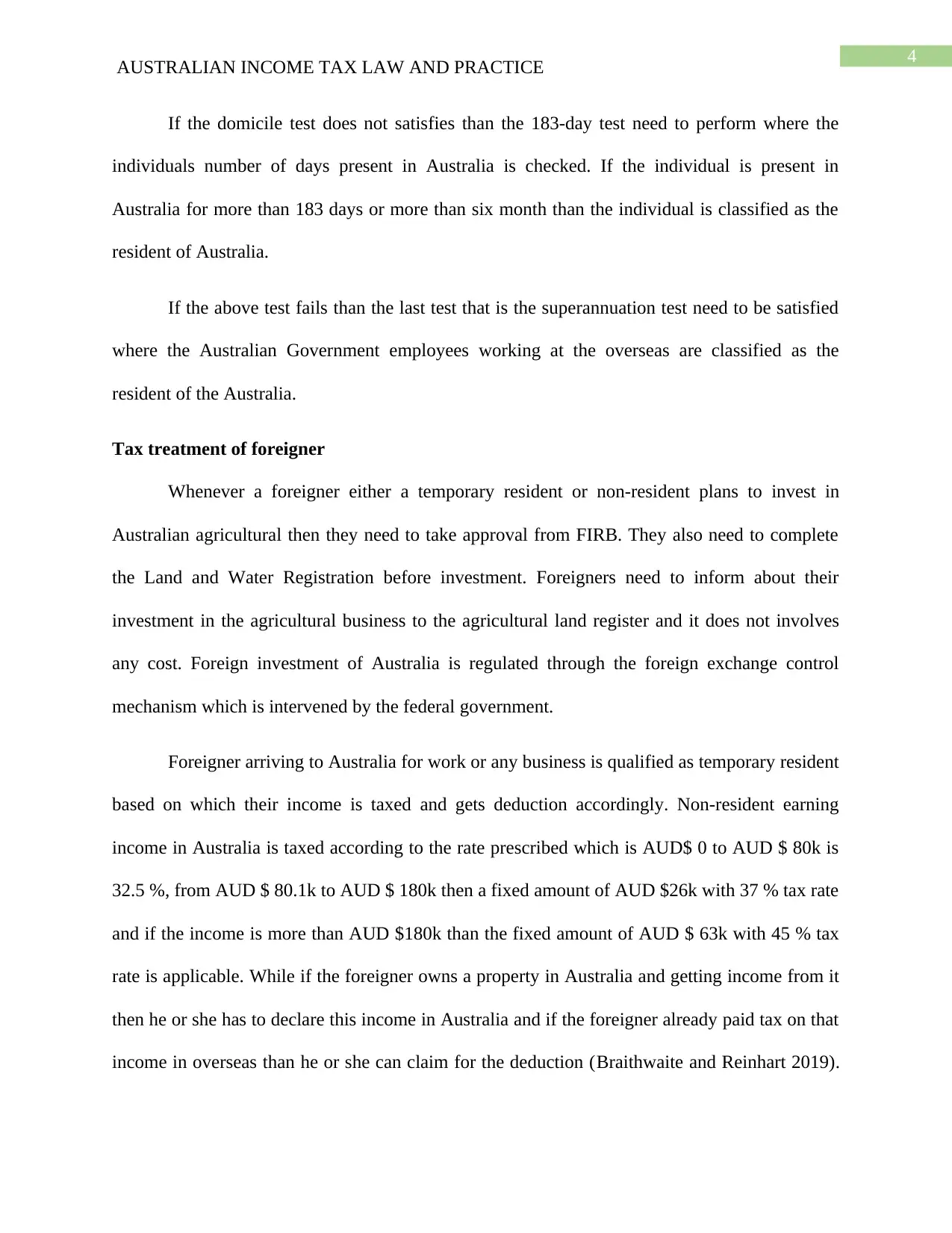
4
AUSTRALIAN INCOME TAX LAW AND PRACTICE
If the domicile test does not satisfies than the 183-day test need to perform where the
individuals number of days present in Australia is checked. If the individual is present in
Australia for more than 183 days or more than six month than the individual is classified as the
resident of Australia.
If the above test fails than the last test that is the superannuation test need to be satisfied
where the Australian Government employees working at the overseas are classified as the
resident of the Australia.
Tax treatment of foreigner
Whenever a foreigner either a temporary resident or non-resident plans to invest in
Australian agricultural then they need to take approval from FIRB. They also need to complete
the Land and Water Registration before investment. Foreigners need to inform about their
investment in the agricultural business to the agricultural land register and it does not involves
any cost. Foreign investment of Australia is regulated through the foreign exchange control
mechanism which is intervened by the federal government.
Foreigner arriving to Australia for work or any business is qualified as temporary resident
based on which their income is taxed and gets deduction accordingly. Non-resident earning
income in Australia is taxed according to the rate prescribed which is AUD$ 0 to AUD $ 80k is
32.5 %, from AUD $ 80.1k to AUD $ 180k then a fixed amount of AUD $26k with 37 % tax rate
and if the income is more than AUD $180k than the fixed amount of AUD $ 63k with 45 % tax
rate is applicable. While if the foreigner owns a property in Australia and getting income from it
then he or she has to declare this income in Australia and if the foreigner already paid tax on that
income in overseas than he or she can claim for the deduction (Braithwaite and Reinhart 2019).
AUSTRALIAN INCOME TAX LAW AND PRACTICE
If the domicile test does not satisfies than the 183-day test need to perform where the
individuals number of days present in Australia is checked. If the individual is present in
Australia for more than 183 days or more than six month than the individual is classified as the
resident of Australia.
If the above test fails than the last test that is the superannuation test need to be satisfied
where the Australian Government employees working at the overseas are classified as the
resident of the Australia.
Tax treatment of foreigner
Whenever a foreigner either a temporary resident or non-resident plans to invest in
Australian agricultural then they need to take approval from FIRB. They also need to complete
the Land and Water Registration before investment. Foreigners need to inform about their
investment in the agricultural business to the agricultural land register and it does not involves
any cost. Foreign investment of Australia is regulated through the foreign exchange control
mechanism which is intervened by the federal government.
Foreigner arriving to Australia for work or any business is qualified as temporary resident
based on which their income is taxed and gets deduction accordingly. Non-resident earning
income in Australia is taxed according to the rate prescribed which is AUD$ 0 to AUD $ 80k is
32.5 %, from AUD $ 80.1k to AUD $ 180k then a fixed amount of AUD $26k with 37 % tax rate
and if the income is more than AUD $180k than the fixed amount of AUD $ 63k with 45 % tax
rate is applicable. While if the foreigner owns a property in Australia and getting income from it
then he or she has to declare this income in Australia and if the foreigner already paid tax on that
income in overseas than he or she can claim for the deduction (Braithwaite and Reinhart 2019).
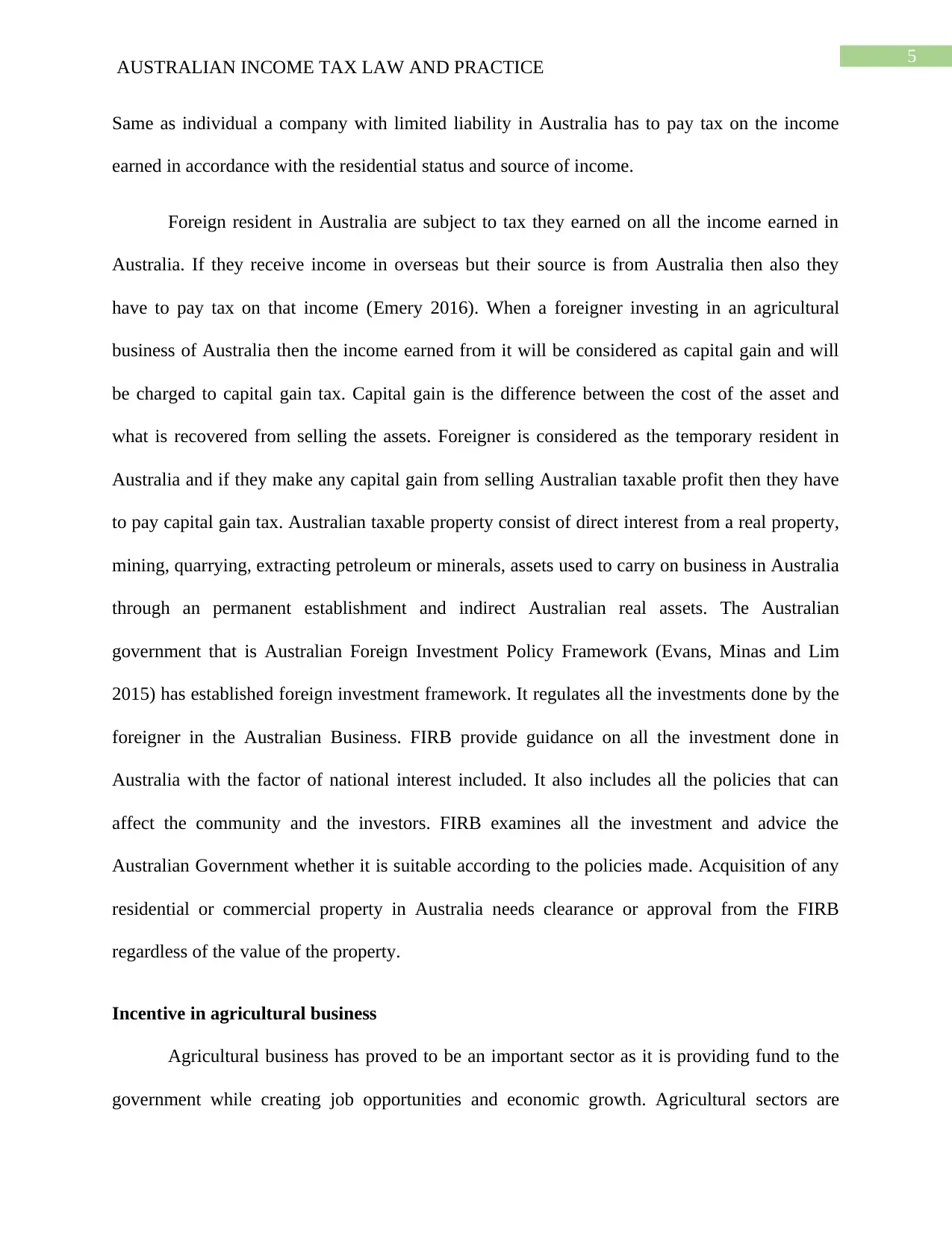
5
AUSTRALIAN INCOME TAX LAW AND PRACTICE
Same as individual a company with limited liability in Australia has to pay tax on the income
earned in accordance with the residential status and source of income.
Foreign resident in Australia are subject to tax they earned on all the income earned in
Australia. If they receive income in overseas but their source is from Australia then also they
have to pay tax on that income (Emery 2016). When a foreigner investing in an agricultural
business of Australia then the income earned from it will be considered as capital gain and will
be charged to capital gain tax. Capital gain is the difference between the cost of the asset and
what is recovered from selling the assets. Foreigner is considered as the temporary resident in
Australia and if they make any capital gain from selling Australian taxable profit then they have
to pay capital gain tax. Australian taxable property consist of direct interest from a real property,
mining, quarrying, extracting petroleum or minerals, assets used to carry on business in Australia
through an permanent establishment and indirect Australian real assets. The Australian
government that is Australian Foreign Investment Policy Framework (Evans, Minas and Lim
2015) has established foreign investment framework. It regulates all the investments done by the
foreigner in the Australian Business. FIRB provide guidance on all the investment done in
Australia with the factor of national interest included. It also includes all the policies that can
affect the community and the investors. FIRB examines all the investment and advice the
Australian Government whether it is suitable according to the policies made. Acquisition of any
residential or commercial property in Australia needs clearance or approval from the FIRB
regardless of the value of the property.
Incentive in agricultural business
Agricultural business has proved to be an important sector as it is providing fund to the
government while creating job opportunities and economic growth. Agricultural sectors are
AUSTRALIAN INCOME TAX LAW AND PRACTICE
Same as individual a company with limited liability in Australia has to pay tax on the income
earned in accordance with the residential status and source of income.
Foreign resident in Australia are subject to tax they earned on all the income earned in
Australia. If they receive income in overseas but their source is from Australia then also they
have to pay tax on that income (Emery 2016). When a foreigner investing in an agricultural
business of Australia then the income earned from it will be considered as capital gain and will
be charged to capital gain tax. Capital gain is the difference between the cost of the asset and
what is recovered from selling the assets. Foreigner is considered as the temporary resident in
Australia and if they make any capital gain from selling Australian taxable profit then they have
to pay capital gain tax. Australian taxable property consist of direct interest from a real property,
mining, quarrying, extracting petroleum or minerals, assets used to carry on business in Australia
through an permanent establishment and indirect Australian real assets. The Australian
government that is Australian Foreign Investment Policy Framework (Evans, Minas and Lim
2015) has established foreign investment framework. It regulates all the investments done by the
foreigner in the Australian Business. FIRB provide guidance on all the investment done in
Australia with the factor of national interest included. It also includes all the policies that can
affect the community and the investors. FIRB examines all the investment and advice the
Australian Government whether it is suitable according to the policies made. Acquisition of any
residential or commercial property in Australia needs clearance or approval from the FIRB
regardless of the value of the property.
Incentive in agricultural business
Agricultural business has proved to be an important sector as it is providing fund to the
government while creating job opportunities and economic growth. Agricultural sectors are
⊘ This is a preview!⊘
Do you want full access?
Subscribe today to unlock all pages.

Trusted by 1+ million students worldwide
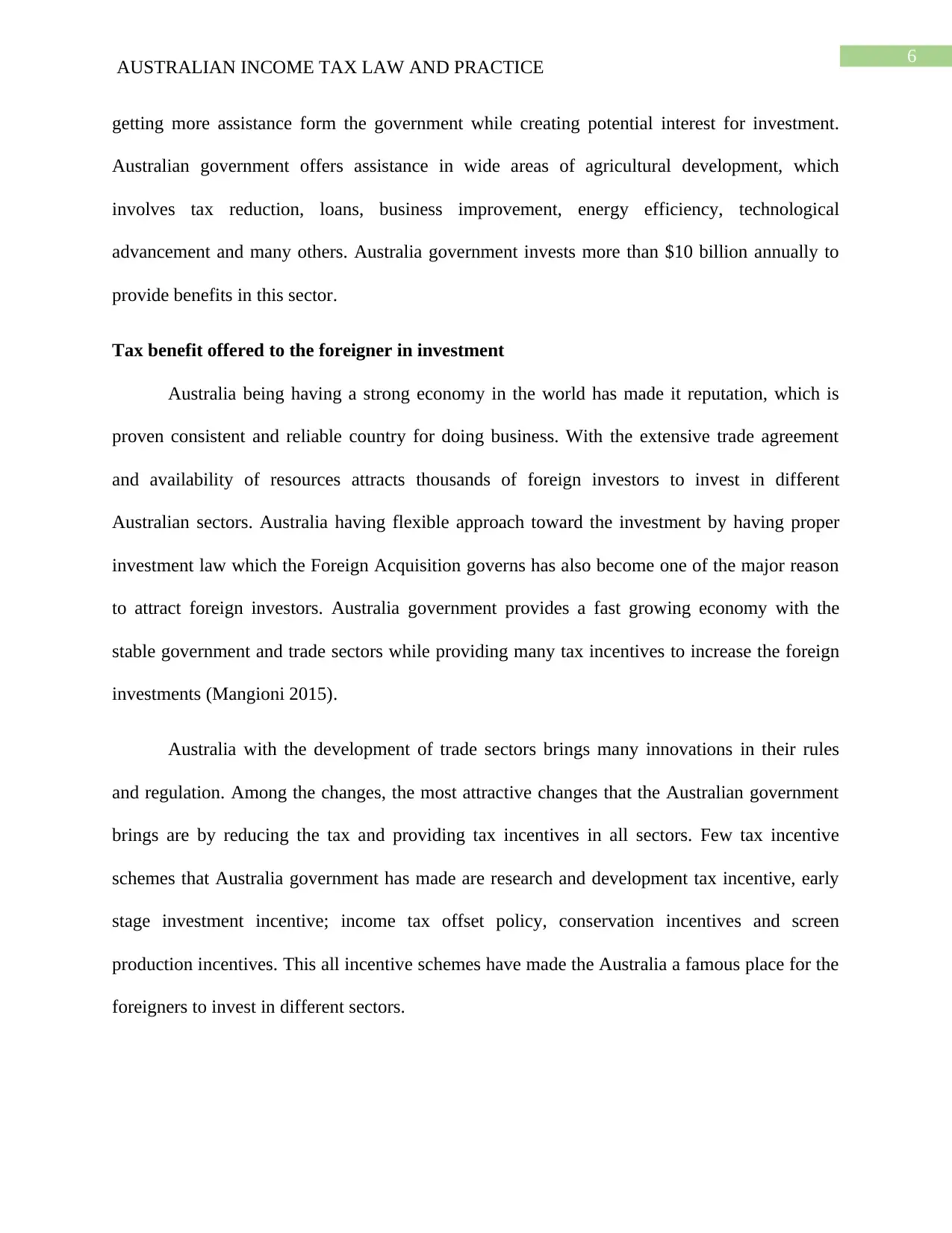
6
AUSTRALIAN INCOME TAX LAW AND PRACTICE
getting more assistance form the government while creating potential interest for investment.
Australian government offers assistance in wide areas of agricultural development, which
involves tax reduction, loans, business improvement, energy efficiency, technological
advancement and many others. Australia government invests more than $10 billion annually to
provide benefits in this sector.
Tax benefit offered to the foreigner in investment
Australia being having a strong economy in the world has made it reputation, which is
proven consistent and reliable country for doing business. With the extensive trade agreement
and availability of resources attracts thousands of foreign investors to invest in different
Australian sectors. Australia having flexible approach toward the investment by having proper
investment law which the Foreign Acquisition governs has also become one of the major reason
to attract foreign investors. Australia government provides a fast growing economy with the
stable government and trade sectors while providing many tax incentives to increase the foreign
investments (Mangioni 2015).
Australia with the development of trade sectors brings many innovations in their rules
and regulation. Among the changes, the most attractive changes that the Australian government
brings are by reducing the tax and providing tax incentives in all sectors. Few tax incentive
schemes that Australia government has made are research and development tax incentive, early
stage investment incentive; income tax offset policy, conservation incentives and screen
production incentives. This all incentive schemes have made the Australia a famous place for the
foreigners to invest in different sectors.
AUSTRALIAN INCOME TAX LAW AND PRACTICE
getting more assistance form the government while creating potential interest for investment.
Australian government offers assistance in wide areas of agricultural development, which
involves tax reduction, loans, business improvement, energy efficiency, technological
advancement and many others. Australia government invests more than $10 billion annually to
provide benefits in this sector.
Tax benefit offered to the foreigner in investment
Australia being having a strong economy in the world has made it reputation, which is
proven consistent and reliable country for doing business. With the extensive trade agreement
and availability of resources attracts thousands of foreign investors to invest in different
Australian sectors. Australia having flexible approach toward the investment by having proper
investment law which the Foreign Acquisition governs has also become one of the major reason
to attract foreign investors. Australia government provides a fast growing economy with the
stable government and trade sectors while providing many tax incentives to increase the foreign
investments (Mangioni 2015).
Australia with the development of trade sectors brings many innovations in their rules
and regulation. Among the changes, the most attractive changes that the Australian government
brings are by reducing the tax and providing tax incentives in all sectors. Few tax incentive
schemes that Australia government has made are research and development tax incentive, early
stage investment incentive; income tax offset policy, conservation incentives and screen
production incentives. This all incentive schemes have made the Australia a famous place for the
foreigners to invest in different sectors.
Paraphrase This Document
Need a fresh take? Get an instant paraphrase of this document with our AI Paraphraser
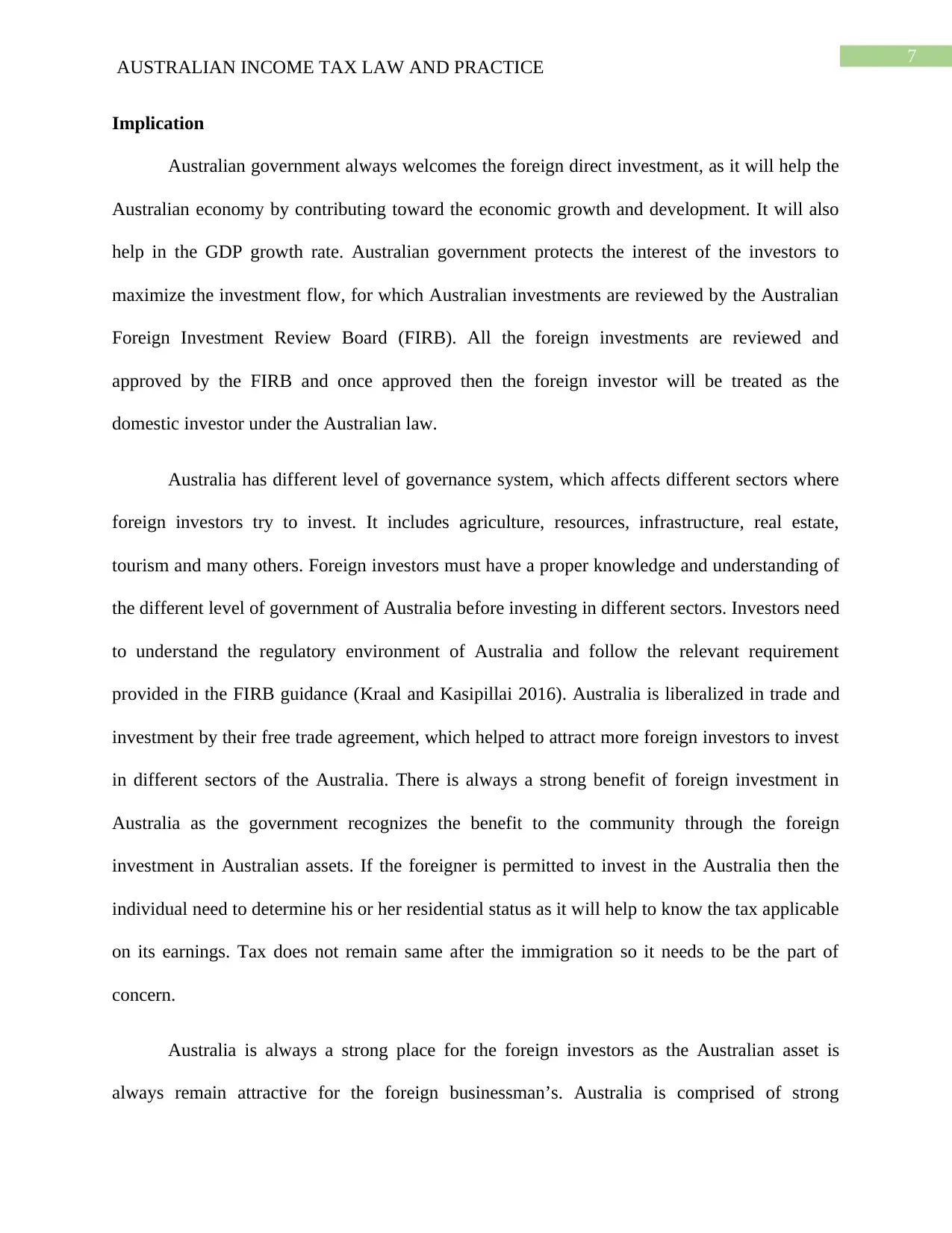
7
AUSTRALIAN INCOME TAX LAW AND PRACTICE
Implication
Australian government always welcomes the foreign direct investment, as it will help the
Australian economy by contributing toward the economic growth and development. It will also
help in the GDP growth rate. Australian government protects the interest of the investors to
maximize the investment flow, for which Australian investments are reviewed by the Australian
Foreign Investment Review Board (FIRB). All the foreign investments are reviewed and
approved by the FIRB and once approved then the foreign investor will be treated as the
domestic investor under the Australian law.
Australia has different level of governance system, which affects different sectors where
foreign investors try to invest. It includes agriculture, resources, infrastructure, real estate,
tourism and many others. Foreign investors must have a proper knowledge and understanding of
the different level of government of Australia before investing in different sectors. Investors need
to understand the regulatory environment of Australia and follow the relevant requirement
provided in the FIRB guidance (Kraal and Kasipillai 2016). Australia is liberalized in trade and
investment by their free trade agreement, which helped to attract more foreign investors to invest
in different sectors of the Australia. There is always a strong benefit of foreign investment in
Australia as the government recognizes the benefit to the community through the foreign
investment in Australian assets. If the foreigner is permitted to invest in the Australia then the
individual need to determine his or her residential status as it will help to know the tax applicable
on its earnings. Tax does not remain same after the immigration so it needs to be the part of
concern.
Australia is always a strong place for the foreign investors as the Australian asset is
always remain attractive for the foreign businessman’s. Australia is comprised of strong
AUSTRALIAN INCOME TAX LAW AND PRACTICE
Implication
Australian government always welcomes the foreign direct investment, as it will help the
Australian economy by contributing toward the economic growth and development. It will also
help in the GDP growth rate. Australian government protects the interest of the investors to
maximize the investment flow, for which Australian investments are reviewed by the Australian
Foreign Investment Review Board (FIRB). All the foreign investments are reviewed and
approved by the FIRB and once approved then the foreign investor will be treated as the
domestic investor under the Australian law.
Australia has different level of governance system, which affects different sectors where
foreign investors try to invest. It includes agriculture, resources, infrastructure, real estate,
tourism and many others. Foreign investors must have a proper knowledge and understanding of
the different level of government of Australia before investing in different sectors. Investors need
to understand the regulatory environment of Australia and follow the relevant requirement
provided in the FIRB guidance (Kraal and Kasipillai 2016). Australia is liberalized in trade and
investment by their free trade agreement, which helped to attract more foreign investors to invest
in different sectors of the Australia. There is always a strong benefit of foreign investment in
Australia as the government recognizes the benefit to the community through the foreign
investment in Australian assets. If the foreigner is permitted to invest in the Australia then the
individual need to determine his or her residential status as it will help to know the tax applicable
on its earnings. Tax does not remain same after the immigration so it needs to be the part of
concern.
Australia is always a strong place for the foreign investors as the Australian asset is
always remain attractive for the foreign businessman’s. Australia is comprised of strong
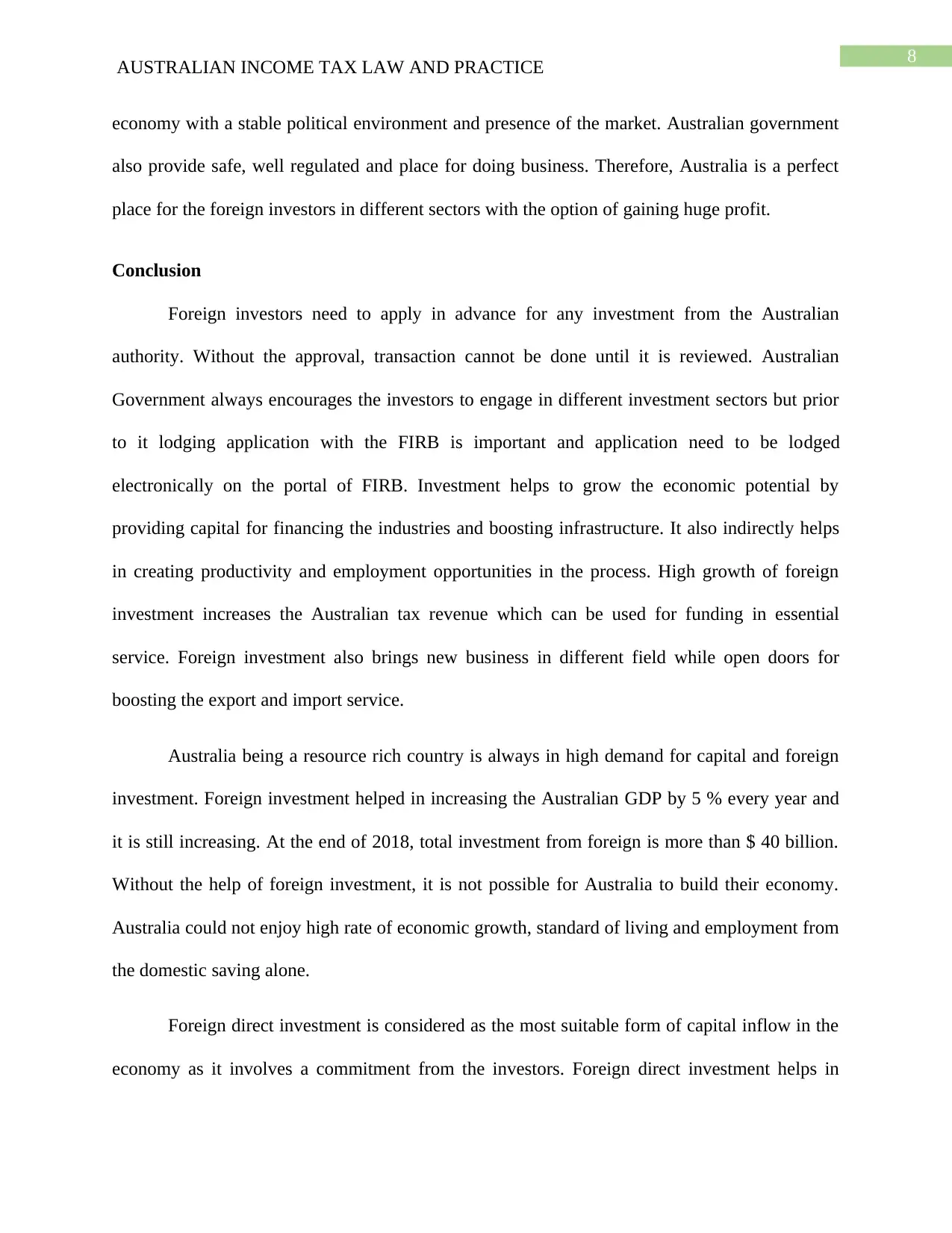
8
AUSTRALIAN INCOME TAX LAW AND PRACTICE
economy with a stable political environment and presence of the market. Australian government
also provide safe, well regulated and place for doing business. Therefore, Australia is a perfect
place for the foreign investors in different sectors with the option of gaining huge profit.
Conclusion
Foreign investors need to apply in advance for any investment from the Australian
authority. Without the approval, transaction cannot be done until it is reviewed. Australian
Government always encourages the investors to engage in different investment sectors but prior
to it lodging application with the FIRB is important and application need to be lodged
electronically on the portal of FIRB. Investment helps to grow the economic potential by
providing capital for financing the industries and boosting infrastructure. It also indirectly helps
in creating productivity and employment opportunities in the process. High growth of foreign
investment increases the Australian tax revenue which can be used for funding in essential
service. Foreign investment also brings new business in different field while open doors for
boosting the export and import service.
Australia being a resource rich country is always in high demand for capital and foreign
investment. Foreign investment helped in increasing the Australian GDP by 5 % every year and
it is still increasing. At the end of 2018, total investment from foreign is more than $ 40 billion.
Without the help of foreign investment, it is not possible for Australia to build their economy.
Australia could not enjoy high rate of economic growth, standard of living and employment from
the domestic saving alone.
Foreign direct investment is considered as the most suitable form of capital inflow in the
economy as it involves a commitment from the investors. Foreign direct investment helps in
AUSTRALIAN INCOME TAX LAW AND PRACTICE
economy with a stable political environment and presence of the market. Australian government
also provide safe, well regulated and place for doing business. Therefore, Australia is a perfect
place for the foreign investors in different sectors with the option of gaining huge profit.
Conclusion
Foreign investors need to apply in advance for any investment from the Australian
authority. Without the approval, transaction cannot be done until it is reviewed. Australian
Government always encourages the investors to engage in different investment sectors but prior
to it lodging application with the FIRB is important and application need to be lodged
electronically on the portal of FIRB. Investment helps to grow the economic potential by
providing capital for financing the industries and boosting infrastructure. It also indirectly helps
in creating productivity and employment opportunities in the process. High growth of foreign
investment increases the Australian tax revenue which can be used for funding in essential
service. Foreign investment also brings new business in different field while open doors for
boosting the export and import service.
Australia being a resource rich country is always in high demand for capital and foreign
investment. Foreign investment helped in increasing the Australian GDP by 5 % every year and
it is still increasing. At the end of 2018, total investment from foreign is more than $ 40 billion.
Without the help of foreign investment, it is not possible for Australia to build their economy.
Australia could not enjoy high rate of economic growth, standard of living and employment from
the domestic saving alone.
Foreign direct investment is considered as the most suitable form of capital inflow in the
economy as it involves a commitment from the investors. Foreign direct investment helps in
⊘ This is a preview!⊘
Do you want full access?
Subscribe today to unlock all pages.

Trusted by 1+ million students worldwide
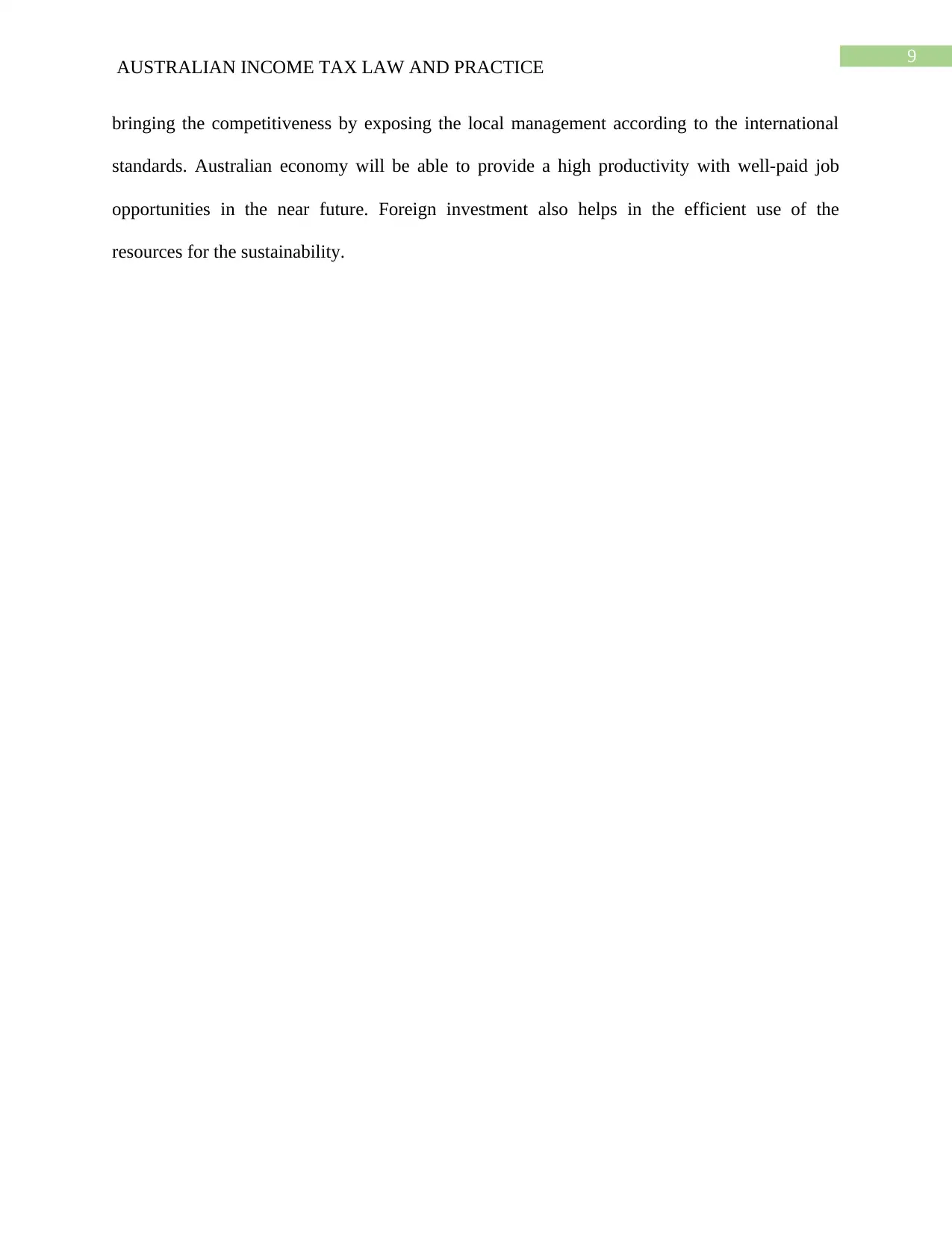
9
AUSTRALIAN INCOME TAX LAW AND PRACTICE
bringing the competitiveness by exposing the local management according to the international
standards. Australian economy will be able to provide a high productivity with well-paid job
opportunities in the near future. Foreign investment also helps in the efficient use of the
resources for the sustainability.
AUSTRALIAN INCOME TAX LAW AND PRACTICE
bringing the competitiveness by exposing the local management according to the international
standards. Australian economy will be able to provide a high productivity with well-paid job
opportunities in the near future. Foreign investment also helps in the efficient use of the
resources for the sustainability.
Paraphrase This Document
Need a fresh take? Get an instant paraphrase of this document with our AI Paraphraser
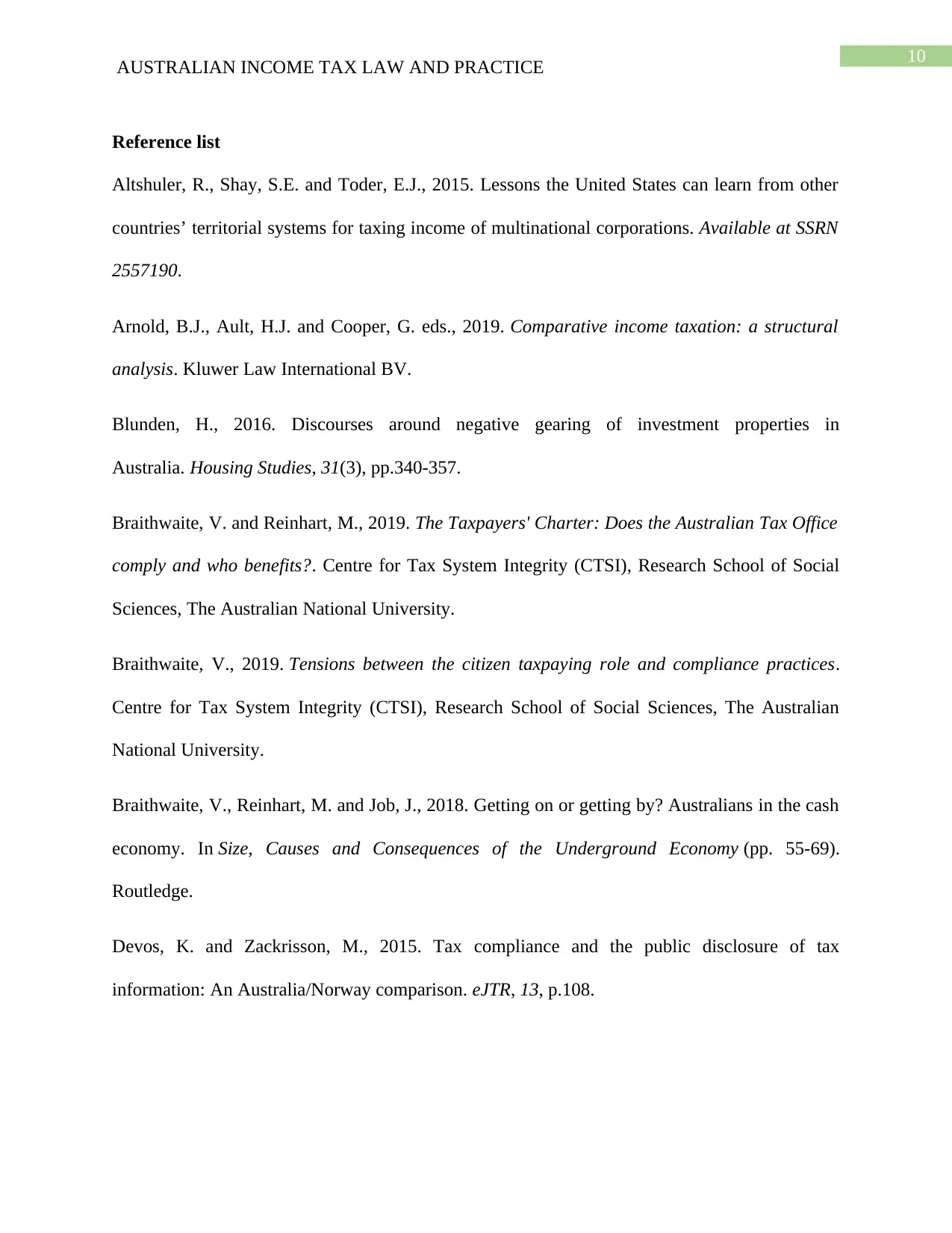
10
AUSTRALIAN INCOME TAX LAW AND PRACTICE
Reference list
Altshuler, R., Shay, S.E. and Toder, E.J., 2015. Lessons the United States can learn from other
countries’ territorial systems for taxing income of multinational corporations. Available at SSRN
2557190.
Arnold, B.J., Ault, H.J. and Cooper, G. eds., 2019. Comparative income taxation: a structural
analysis. Kluwer Law International BV.
Blunden, H., 2016. Discourses around negative gearing of investment properties in
Australia. Housing Studies, 31(3), pp.340-357.
Braithwaite, V. and Reinhart, M., 2019. The Taxpayers' Charter: Does the Australian Tax Office
comply and who benefits?. Centre for Tax System Integrity (CTSI), Research School of Social
Sciences, The Australian National University.
Braithwaite, V., 2019. Tensions between the citizen taxpaying role and compliance practices.
Centre for Tax System Integrity (CTSI), Research School of Social Sciences, The Australian
National University.
Braithwaite, V., Reinhart, M. and Job, J., 2018. Getting on or getting by? Australians in the cash
economy. In Size, Causes and Consequences of the Underground Economy (pp. 55-69).
Routledge.
Devos, K. and Zackrisson, M., 2015. Tax compliance and the public disclosure of tax
information: An Australia/Norway comparison. eJTR, 13, p.108.
AUSTRALIAN INCOME TAX LAW AND PRACTICE
Reference list
Altshuler, R., Shay, S.E. and Toder, E.J., 2015. Lessons the United States can learn from other
countries’ territorial systems for taxing income of multinational corporations. Available at SSRN
2557190.
Arnold, B.J., Ault, H.J. and Cooper, G. eds., 2019. Comparative income taxation: a structural
analysis. Kluwer Law International BV.
Blunden, H., 2016. Discourses around negative gearing of investment properties in
Australia. Housing Studies, 31(3), pp.340-357.
Braithwaite, V. and Reinhart, M., 2019. The Taxpayers' Charter: Does the Australian Tax Office
comply and who benefits?. Centre for Tax System Integrity (CTSI), Research School of Social
Sciences, The Australian National University.
Braithwaite, V., 2019. Tensions between the citizen taxpaying role and compliance practices.
Centre for Tax System Integrity (CTSI), Research School of Social Sciences, The Australian
National University.
Braithwaite, V., Reinhart, M. and Job, J., 2018. Getting on or getting by? Australians in the cash
economy. In Size, Causes and Consequences of the Underground Economy (pp. 55-69).
Routledge.
Devos, K. and Zackrisson, M., 2015. Tax compliance and the public disclosure of tax
information: An Australia/Norway comparison. eJTR, 13, p.108.
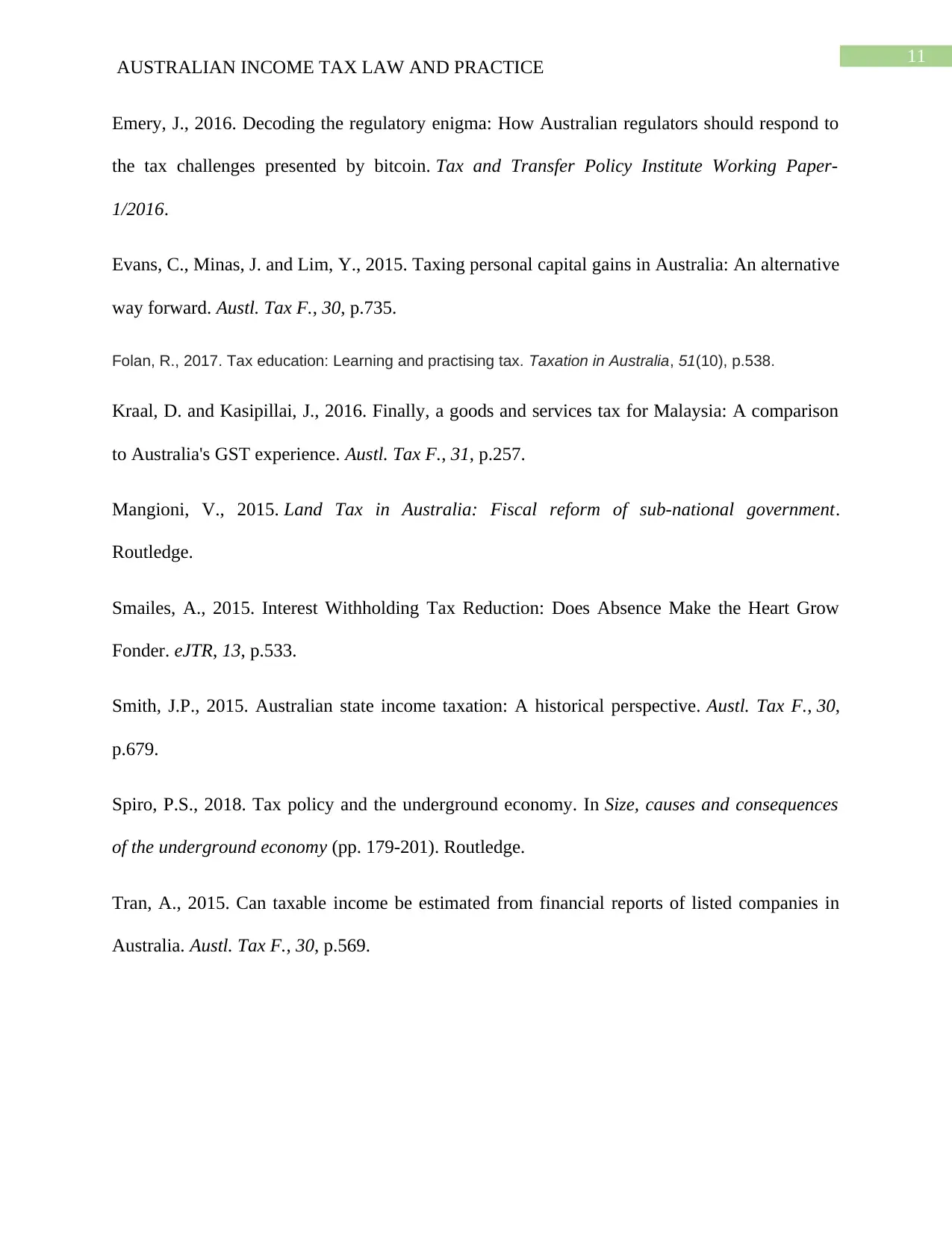
11
AUSTRALIAN INCOME TAX LAW AND PRACTICE
Emery, J., 2016. Decoding the regulatory enigma: How Australian regulators should respond to
the tax challenges presented by bitcoin. Tax and Transfer Policy Institute Working Paper-
1/2016.
Evans, C., Minas, J. and Lim, Y., 2015. Taxing personal capital gains in Australia: An alternative
way forward. Austl. Tax F., 30, p.735.
Folan, R., 2017. Tax education: Learning and practising tax. Taxation in Australia, 51(10), p.538.
Kraal, D. and Kasipillai, J., 2016. Finally, a goods and services tax for Malaysia: A comparison
to Australia's GST experience. Austl. Tax F., 31, p.257.
Mangioni, V., 2015. Land Tax in Australia: Fiscal reform of sub-national government.
Routledge.
Smailes, A., 2015. Interest Withholding Tax Reduction: Does Absence Make the Heart Grow
Fonder. eJTR, 13, p.533.
Smith, J.P., 2015. Australian state income taxation: A historical perspective. Austl. Tax F., 30,
p.679.
Spiro, P.S., 2018. Tax policy and the underground economy. In Size, causes and consequences
of the underground economy (pp. 179-201). Routledge.
Tran, A., 2015. Can taxable income be estimated from financial reports of listed companies in
Australia. Austl. Tax F., 30, p.569.
AUSTRALIAN INCOME TAX LAW AND PRACTICE
Emery, J., 2016. Decoding the regulatory enigma: How Australian regulators should respond to
the tax challenges presented by bitcoin. Tax and Transfer Policy Institute Working Paper-
1/2016.
Evans, C., Minas, J. and Lim, Y., 2015. Taxing personal capital gains in Australia: An alternative
way forward. Austl. Tax F., 30, p.735.
Folan, R., 2017. Tax education: Learning and practising tax. Taxation in Australia, 51(10), p.538.
Kraal, D. and Kasipillai, J., 2016. Finally, a goods and services tax for Malaysia: A comparison
to Australia's GST experience. Austl. Tax F., 31, p.257.
Mangioni, V., 2015. Land Tax in Australia: Fiscal reform of sub-national government.
Routledge.
Smailes, A., 2015. Interest Withholding Tax Reduction: Does Absence Make the Heart Grow
Fonder. eJTR, 13, p.533.
Smith, J.P., 2015. Australian state income taxation: A historical perspective. Austl. Tax F., 30,
p.679.
Spiro, P.S., 2018. Tax policy and the underground economy. In Size, causes and consequences
of the underground economy (pp. 179-201). Routledge.
Tran, A., 2015. Can taxable income be estimated from financial reports of listed companies in
Australia. Austl. Tax F., 30, p.569.
⊘ This is a preview!⊘
Do you want full access?
Subscribe today to unlock all pages.

Trusted by 1+ million students worldwide
1 out of 12
Related Documents
Your All-in-One AI-Powered Toolkit for Academic Success.
+13062052269
info@desklib.com
Available 24*7 on WhatsApp / Email
![[object Object]](/_next/static/media/star-bottom.7253800d.svg)
Unlock your academic potential
Copyright © 2020–2026 A2Z Services. All Rights Reserved. Developed and managed by ZUCOL.





